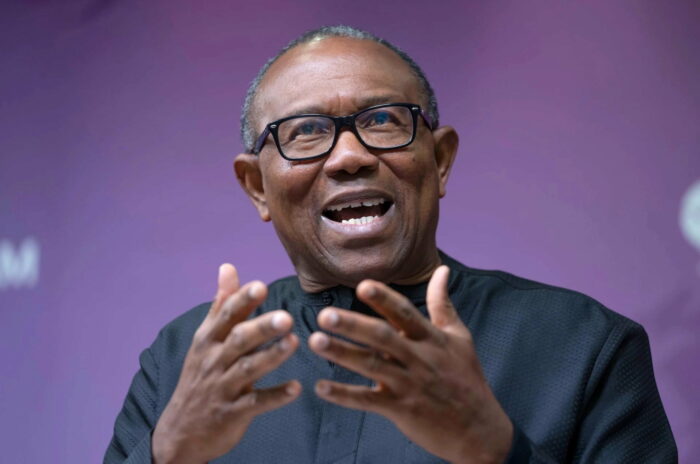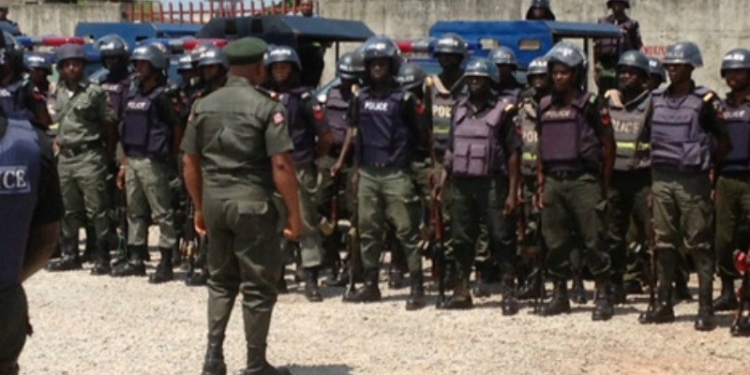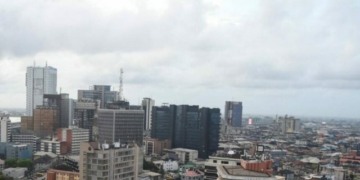- For decades, there has been growing call for establishment of state police in Nigeria
- Bill to establish State police passes second reading in the House of Representatives on February 20
- Mixed reactions trail the bill as Obi backs National Assembly, condemns incessant attacks on innocent citizens
On February 20, 2024, the bill seeking to alter the provision of the Constitution of the Federal Republic of Nigeria to provide for the establishment of the state police passed through second reading.
According to Section 214 of the 1999 Nigerian Constitution, it states that, “there shall be a Police Force for Nigeria, which shall be known as the Nigeria Police Force, and no other Police Force shall be established for the Federation or any part thereof”.
WITHIN NIGERIA gathered that the proposed legislation titled “A Bill for an Act to Alter the Constitution of the Federal Republic of Nigeria, 1999 to Provide for Establishment of State Police and for Related Matters (HB.617),” was sponsored by the Deputy Speaker, Hon. Benjamin Okezie Kalu and 14 other lawmakers.
However, leading the debate, Hon. Tolani Shagaya, who is one of the sponsors of the bill noted that the primary purpose of government as enshrined in Section 14(2)(b) of the Constitution of the Federal Republic of Nigeria, 1999 (as altered) is the security and welfare of the citizens.

Lamenting the deteriorating level of insecurity in the country, Shagaya noted that in recent times, the nation’s collective security had been greatly challenged and state policing was not only inevitable, but urgently desired to tackle the mounting challenges of insecurity.
In his words, “the establishment of state police is a clarion call for a tailored, community-centric policing system; and an acknowledgment that our states are uniquely positioned to address the security challenges within their borders.
“The transfer of ‘police’ from the ‘Exclusive Legislative List’ to the ‘Concurrent Legislative List,’ a move that effectively empowers states to have state controlled policing; the introduction of a comprehensive framework to ensure cohesion as well as accountability and uniform standards between the Federal Police and State Police; the provision of prescribed rigorous safeguards preventing unwarranted interference by the federal police in state police affairs, emphasising collaboration and intervention only under well-defined circumstances.
“The establishment of State Police Service Commissions as distinct from the Federal Police Service Commission with clearly defined roles and jurisdictions; a re-calibration of the National Police Council to include the Chairmen of the State Police Service Commissions, emphasising the collaborative and consultative nature of policing in our federal system, a recognition of the possible financial challenges which may be faced by states police, by empowering the federal government to provide grants or aids subject to the approval of the National Assembly, thus ensuring adequate resources for effective policing, etc.”
Furthermore, he stressed that the alterations proposed in the bill were not just alterations to the Constitution of the Federal Republic of Nigeria, but also the building blocks of a more secure, accountable and resilient Nigeria.
Hon. Ahmed Jaha while contributing to the bill stated that the bill was timely as security is the responsibility of all and everybody’s business and that with community policing and Nigerian police working in tandem, they will rid communities of all forms of crime.
Growing call for state police
For over three decades now, Nigerians have continued to clamour for the establishment of state police with a view to curbing the growing security challenges across the country.
According to available statistics, Nigeria has less than 400,000 police officers and men, most of whom, though ill-equipped and poorly motivated, are expected to police the country’s over 200 million population with a land mass of 923, 768 square kilometres.
It is estimated that Nigeria has a police officer to citizen ratio of 1:540, below the United Nation’s recommended ratio of 1:450.
The growing case of security challenges in many states of the Federation has literally necessitated governors of such states seeking solutions to these problems by establishing quasi-state police or what could be called Vigilante Group.
For instance, in 1998, as the Anambra and Abia states were overwhelmed by unprecedented level of armed robbery, assassinations and other criminal activities, they resorted to establishment of Bakassi Boys.
These groups took their name from the Bakassi peninsula, an oil-rich peninsula in the Annang-Efik-Ibibio region of the coastal south-eastern Nigeria. The Bakassi Boys emerged as a vigilante group simultaneously with sharp increases in the crime rate of Abia State and by extension, Anambra state.
They originally enjoyed the support of the governor, Orji Uzor Kalu. He appreciated the effectiveness of the group in combating the crimes in Aba and environs.
However, as the crime rate was going down in Aba, other eastern Igbo cities’ crime rates remained the same, and the crime rates in some places, including Onitsha in Anambra state were still rising.
The Bakassi Boys then were invited to other major cities, including Onitsha and Owerri, to rid them of criminal elements.
In time, law enforcement agencies became regarded as ineffective in the region, and the Bakassi endeared themselves to many Igbo traders and merchants.
However, political opponents of some governors accused the group of extrajudicial killings and accused governors of using the Bakassi Boys as weapons of intimidation.
As a result of heightened opposition, the group has attempted to rebrand itself as Anambra State Vigilante Services. They were later disbanded owing to growing opposition of the activities of the group.
Establishment of Ebubeagu, Amotekun
In any case, with the collapse of Bakassi Boys and the growing security challenges in the country, many regions once again resorted to self-help with regards to security outfits.
On January 9, 2020, the South West governors announced the establishment of security outfit called Amotekun.
Amotekun was a child of circumstance as the region was overrun by the Fulani herdsmen who were allegedly killing, maiming and kidnapping the people of the area for ransom.
The South West governors that hot Thursday afternoon officially launched a security outfit, code-named in Ibadan, the Oyo state capital.
Rotimi Akeredolu, who was the Chairman, Western Nigeria Governors’ Forum, while Governors Seyi Makinde of Oyo, Kayode Fayemi of Ekiti, Deputy Governor of Ogun, Noimat Salako-Oyedele, Deputy Governor of Osun, Benedict Gboyega Alabi, the Ooni of Ife, Oba Enitan Adeyeye Ogunwusi, Deji Osinbogun and Banjo Akintoye, , a Professor, were among dignitaries that graced the occasion.
The six governors, Rotimi Akeredolu (Ondo) Seyi Makinde (Oyo), Gboyega Oyetola (Osun), Babajide Sanwo-Olu (Lagos) and Kayode Fayemi (Ekiti), had the year before agreed to establish Amotekun, aimed at strengthening the security situation in the region.
Each of the six States procured 20 Pick-up Vans equipped with communication gadgets and one hundred motorcycles for the take-off of the Security Network.
Following the establishment and near success story of Amotekun in the South West region, on April 10, 2021, the governors in the South East announced in a communique issued after a meeting held in Owerri, the Imo state capital, the establishment of Ebubeagu security outfit.
After much deliberation, the South-East Governors established a security outfit, Ebubeagu to curtail the rising insecurity in the region.
The then Chairman of the South-East Governors Forum, Dave Umahi, made the announcement after a meeting in Imo State.
According to him, the headquarters of the establishment will be in Enugu State.
Umahi, in a communique he read, explained that Ebubeagu will also monitor the activities of vigilante groups in member states.
“After exhaustive discussions on the current security challenges in the South East and with valuable contributions from participants at the first South-East security summit in Owerri on this day Sunday, April 11th 2021, it was resolved as follows:
“To strongly and unequivocally condemn terrorism and banditry in any part of Nigeria, particularly in the South East. The meeting strongly condemns the burning of police stations, violent attacks on custodial centres with the unlawful release of inmates, and the killings including security personnel, natives/ farmers and headsmen.
“That the five South-East states are on the same page with the federal government on the issue of security challenges in the country. To this end, the meeting makes it absolutely clear that the Southeast will stand resolutely with the federal government to fight terrorists and bandits to a finish.

“That the political leadership in the South-East has resolved to bring together all the arsenals at their command, as one united zone, to fight and flush out criminals and terrorist from the zone.
“That the summit resolved that to achieve this, there is a need to galvanise all the relevant stakeholders in the south-east, the political class, the business community, the bureaucrats and the intelligentsia to provide all necessary support to security operatives in the five south-east states to ensure total success in the fight against criminality in the zone.
“That the heads of all the security agencies in the southeast have resolved to exchange intelligence in a seamless, effective new order that will help to checkmate crime in the zone.
“That to fast track crime-busting in the southeast, the heads of security agencies have been mandated to draw up a comprehensive list of their logistics and material needs for sustainable success in the fight against criminality, for the immediate provision by the leadership of the South East.
“That a committee made up of security personnel, government officials and relevant stakeholders are set up to coordinate and monitor the implementation of the southeast joint security platform.
“To applaud the initiative of the Southeast security summit and to make it a statutory summit that will convene every quarter while its hosting shall rotate among the five southeast states.”
The meeting resolved to maintain a joint security vigilante for the South East otherwise known as Ebube Agu.
The meeting appreciated the formation of a South-East joint security outfit, named Ebubeagu. Headquarters in Enugu, to coordinate our vigilante in the South East.
South-East Governors requested the Acting IGP to stop the influx of IGP monitoring units but to allow CPs and State and Zonal commands to handle their cases.
Meeting approved that the acting IGP and other security chiefs do invite the leadership of Ohaneze Ndigbo and CAN to find out the reason for the increasing insecurity of the South East.
Meeting agreed that military police in the South-East should be adequately funded and become effective.
Meeting agreed that open grazing has been banned and the security agency should implement the ban.
The meeting encouraged a peaceful coexistence of farmers and headers to allow governors succeed in the fight against criminality.”
Argument for and against establishment of state police
As the bill to establish the state police scaled second reading in the House of Representatives, many Nigerians have continued to express their opinion on the situation.
A former member of the House of Representatives from Abia State, Nze Chikwem Esiaga, on Saturday, February 24, 2024 kicked against the call for the establishment of the state police in Nigeria.
In an opinion shared Saturday morning through a statement, Esiaga recommended the establishment of local government police instead, which will be under the control of duly elected council chairmen in all federating states.
The ex-lawmaker insisted that the state police would serve as a tool in the hands of state governors for the victimization of perceived opponents who are opposed to their draconian policies and programmes.
According to him, “until LGA elections are conducted by INEC throughout the federation, the allocations will never be accounted for.
“The governors who have turned out to be emperors of their various states will never allow the 3rd tier of government to function effectively.
“Until we get it right at the LGA level, this high level of insecurity and chaotic economic situation in Nigeria will remain with us”.
“Ashiwaju Bola Ahmed Tinubu as a tree cannot and I repeat cannot make a forest in the presence of these vipers who do not account for the security votes and LG allocations which they grab from the centre.
“This reminds me of the clamour for state police which will end up like the State Independent Electoral Commission.
“The way to go is LG police to be under the duly elected council chairmen else governors will use state police to deal ruthlessly with their perceived political opponents as was the case in the 1st republic”.
However, lending his voice to the clamour, the Presidential candidate of the Labour Party Mr. Peter Obi has thrown his weight behind the creation of state police.
Obi on Tuesday, February 20,2024 while reacting to the growing call by the governors and indeed many Nigerians for the establishment of the state police, the 2023 LP presidential candidate stated that this is a welcome idea.
“While the idea of State Policing as discussed recently by the President and the 36 States Governors, is a welcome development, and while looking forward to its implementation, which may still take a while, all efforts, at the moment, should be geared towards ending the ugly trend of insecurity in the nation,” Obi wrote.
“We should not just wait for the proposed state Police to do the magic while we become lackadaisical and allow criminals to run riot like the recent reports in Zamfara and Kaduna states.
“Waking up every day to the sad news of terror attacks around the country remains very worrisome.
“A terrorist attack was also reported in Kauru Local Government Area of Kaduna State where six persons were reportedly killed and about 50 abducted. What is more worrisome is that these terrorists now boldly target security agents.
“Just yesterday, bandits were said to have attacked a police station in Zamfara killing the Divisional Crime Officer, DCO. These and many other violent attacks and kidnapping-for-ransom in the country should keep the government and security agencies on their toes.
“Such a high level of insecurity when combined with the high level of hunger and poverty in the country, forms a perfect recipe for disaster in our nation.”
Obi further said all possible measures should be taken to fight insecurity across the nation.
“We must therefore take all possible measures to ensure the security of lives and property in our dear nation,” he added.
“I urge the government and our security agencies to expedite action on ending these terror attacks on the Nigerian people and ensure that every Nigerian is free to live securely in every part of the nation.
“I commiserate with the families who have lost dear ones to these violent attacks in the nation while praying for the safe rescue of those in captivity.”






Discussion about this post